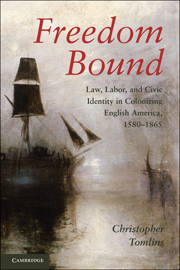Book contents
- Frontmatter
- Contents
- Tables and Figures
- Acknowledgments
- Freedom Bound
- Prologue Beginning
- Part I Manning, Planting, Keeping
- 1 Manning
- 2 Planting
- 3 Keeping (i)
- 4 Keeping (ii)
- Part II Poly-Olbion; or The Inside Narrative
- Part III “What, then, is the American, this new man?”
- Appendices to Chapter 1
- Index
- References
4 - Keeping (ii)
English Desires, Designs
Published online by Cambridge University Press: 05 June 2012
- Frontmatter
- Contents
- Tables and Figures
- Acknowledgments
- Freedom Bound
- Prologue Beginning
- Part I Manning, Planting, Keeping
- 1 Manning
- 2 Planting
- 3 Keeping (i)
- 4 Keeping (ii)
- Part II Poly-Olbion; or The Inside Narrative
- Part III “What, then, is the American, this new man?”
- Appendices to Chapter 1
- Index
- References
Summary
Plutarch said long ago that the civilizing of barbarians had been made the pretext for aggression, which is to say that a greedy longing for the property of another often hides itself behind such a pretext.
Hugo Grotius, Mare Liberum (1608)Drive your cart and your plow over the bones of the dead.
William Blake, Proverbs of Hell (1790–93)Thus far I have concentrated on early-modern narratives of the legalities of colonizing that held the conquest and subjugation of barbarian indigenous peoples justifiable by their antagonistic responses to the intrusions of strangers, from which the occupation and possession of the territories they inhabited followed as a necessary consequence of the wars appropriately waged against them. These narratives were pan-European in expression, and rooted in a half millennium of warfare in and around the Mediterranean basin. Considered idiomatically, they and their critics dominated sixteenth-century colonizing discourse. In this chapter, I will describe the emergence of a new narrative trajectory that appeared in the late sixteenth century and came to predominate in the seventeenth. Rather than pan-European in expression, this narrative was in important respects a peculiarity of the English. It elevated land over people as the primary object of the colonizer’s attention. It rearranged both the legalities and the institutional mechanisms of colonizing accordingly.
Though new and distinct, the English narrative of colonizing overlapped with its predecessor, with which it had much in common. Its traces can be found in early sixteenth-century humanism; its roots lay in the law of nature and nations, to which it annexed vernacular English inflections. And its shift of emphasis was necessarily relative rather than absolute; for, inconveniently, indigenous inhabitants in reality remained obstinately present in the imagined empty landscape of English desire, and so had to be acknowledged in one fashion or another. Yet for all those remainders, what is surely a remarkable and distinguishing characteristic of the English colonizing project’s impact on the North American mainland is the thoroughness of its reinvention (legal, political, material, jurisdictional) of the terrain upon which projectors seated their colonies – its fierce concentration upon the appropriation of territory, its mental and physical conversion of that territory to distinct usages and spatial disciplines, its establishment of going agricultural concerns, and, underlying all, the substantial and protracted task of replacing an existing and intractable population, in which it had little interest, with new populations introduced to occupy the land, build plantations and farms, work their fields, and generally undertake the immense labor of constructing the civic extrastructure of European inhabitation.
- Type
- Chapter
- Information
- Freedom BoundLaw, Labor, and Civic Identity in Colonizing English America, 1580–1865, pp. 133 - 190Publisher: Cambridge University PressPrint publication year: 2010



